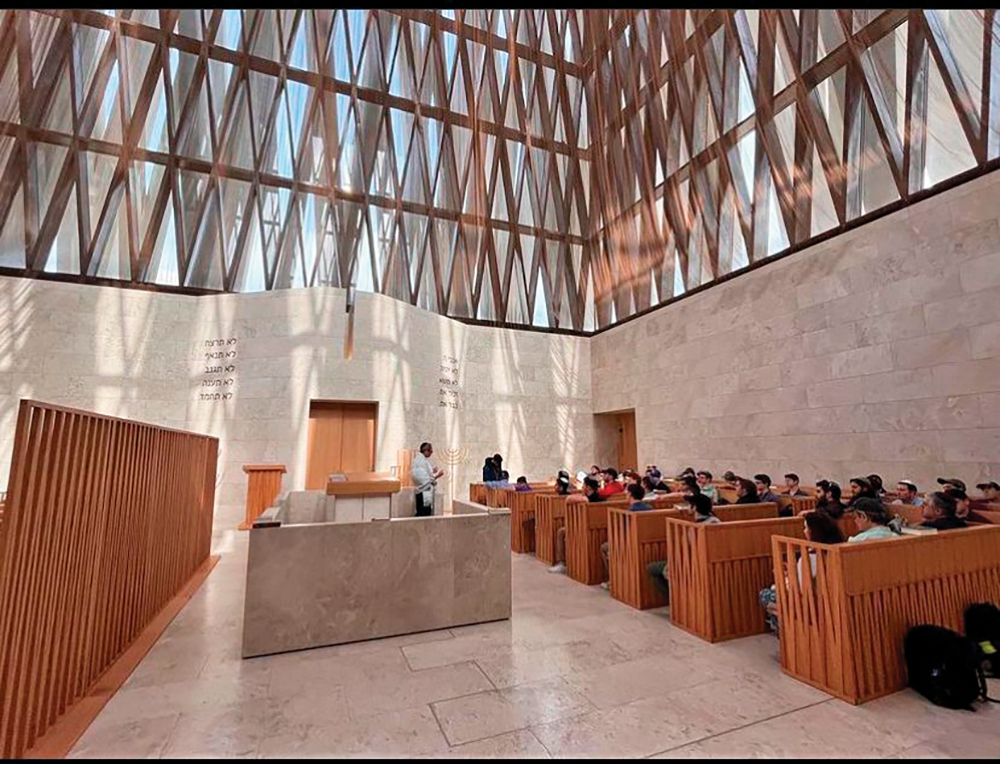
At 7:20 a.m., when the students of Migdal HaTorah would normally be waking for Shacharit, we found ourselves boarding a flight to the United Arab Emirates (UAE). This was to be the yeshiva’s third trip to the country, when it was determined that the current geopolitical climate of Israel underscored the need for us to have this valuable experience.
The trip had two key goals, according to the dean of students and trip organizer Rabbi Aryeh Wasserman: “We wanted the students to recognize that Israel should continue to strengthen relationships with its neighbors, especially in light of October 7.” Secondly, as many of the students would see, the UAE is a strong ally of Israel, and making “peace with the surrounding Arab states is nuanced and complex, not what the media often portrays.”
However, on a broader level there is also much that Israel can learn from the UAE, Rabbi Wasserman believes. “The UAE has immense respect for and prioritizes prayer,” he said, pointing out that all hotel rooms have an arrow on the ceiling, pointing towards qibla, the Islamic mizrach. Secondly, he admires the “respectful, others first attitude” that is pervasive in the Emirates and exemplifies the middah of ואהבת לרעך כמוך.
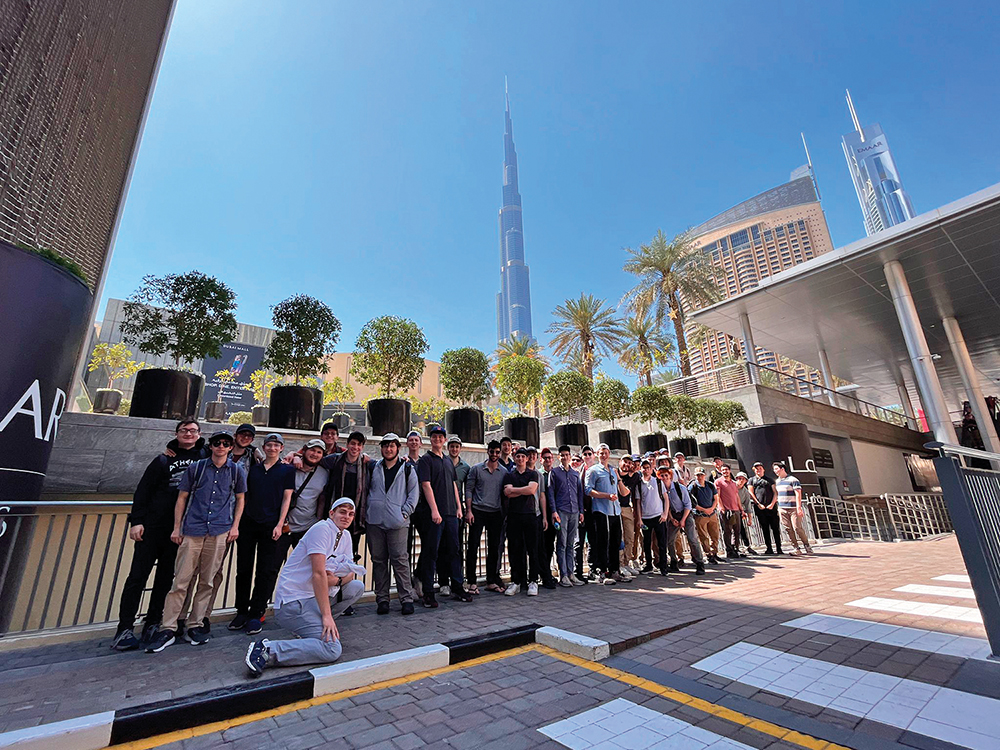
Immediately after dropping our bags off at the hotel, we were ushered to a meeting with Dr. Abdullah Galadari, an esteemed professor of comparative religion at Abu Dhabi’s internationally acclaimed Khalifa University. Dr. Galadari is an expert in comparative theology and Christology, but his main focus is Qur’anic Studies, specifically viewing the Qur’an through the lens of its late antiquity context with its biblical, extra-biblical and rabbinic engagements. We explored the shared roots of Judaism and Islam. Drawing parallels between the two faiths, he elucidated how Islamic tradition has evolved from its Judaic origins, shedding light on the intricate similarities between the Qur’an and Torah. Especially interesting to Coby Farkovits of Englewood was learning that the Qur’an contains many tales from the midrash.
After saying our goodbyes to Dr. Galadari and heading to our next destination, many of us found ourselves in a mosque for the very first time, specifically the Sheikh Mohammed Center for Cultural Understanding. Yossi Zifkin of Detroit was particularly fascinated with the “absolute atmosphere of prayer” he encountered in the mosque. He observed the mosque’s simplicity, a circular room with a carpet and no benches or books to be found. While at the mosque, we were able to hear from Yousef, and were intrigued at the unique shared emphasis that Judaism and Islam place on monotheism.
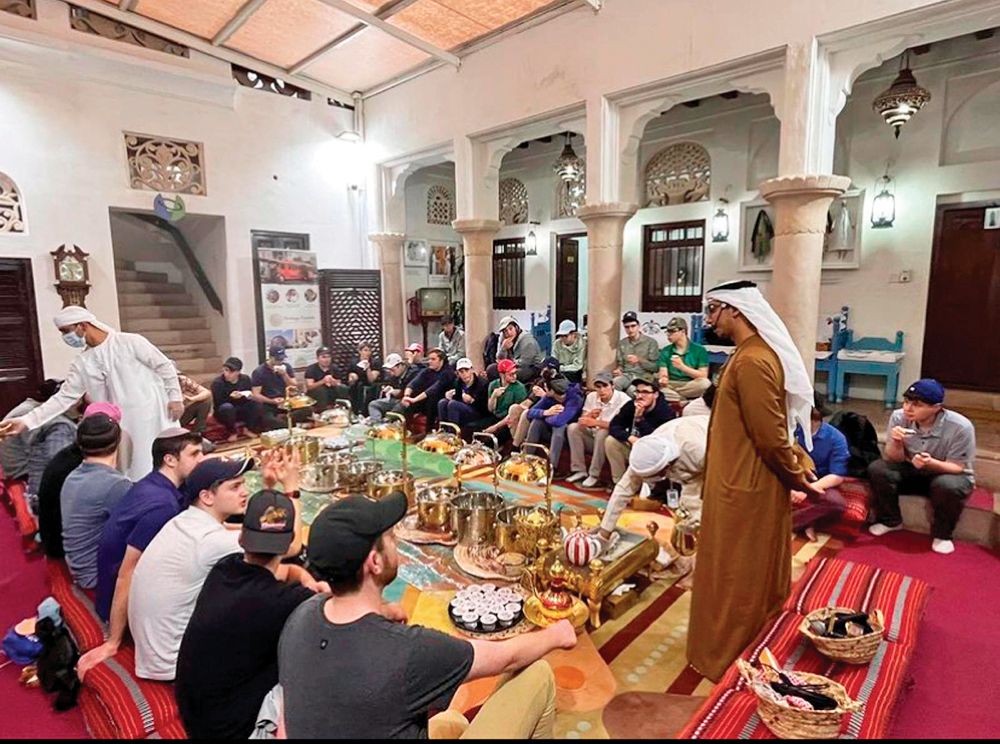
For dinner that night, the yeshiva was hosted by a local Emirati, eating kosher food and engaging in riveting dialogue about the future of Israel-Arab peace. While we davened Maariv, our host stepped out to the local mosque for the Islamic Isha prayer, and Evan Simon of Toronto, Canada noted the short bonding moment our two groups had over our shared prayer obligation at this time. “It reminded me of trying to get a minyan, trying to figure out who davened already. For a second I forgot he wasn’t Jewish.”
While there, I personally engaged our host, a staunch advocate of Israel’s right to defend itself, in a discussion about the current political climate, and was fascinated to hear what our host had to say about the events of October 7. He acknowledged Israel’s need to eliminate Hamas, but noted the immense devastation Israel has been wreaking on Gaza, and the ensuing geopolitical problems. However, he was most upset that Israel did not turn to the UAE on October 7 and ask for help. He pointed out that the UAE did not call their ambassador to Israel back like many other Muslim nations, and insisted that the UAE would have stepped in and coordinated a plan with Israel. Such a plan not only would have mitigated the loss of Palestinian life and given Israel a strong military ally in their operations, it would have shown the world that a Muslim country stands with Israel, giving their assault on Gaza vastly more international legitimacy.
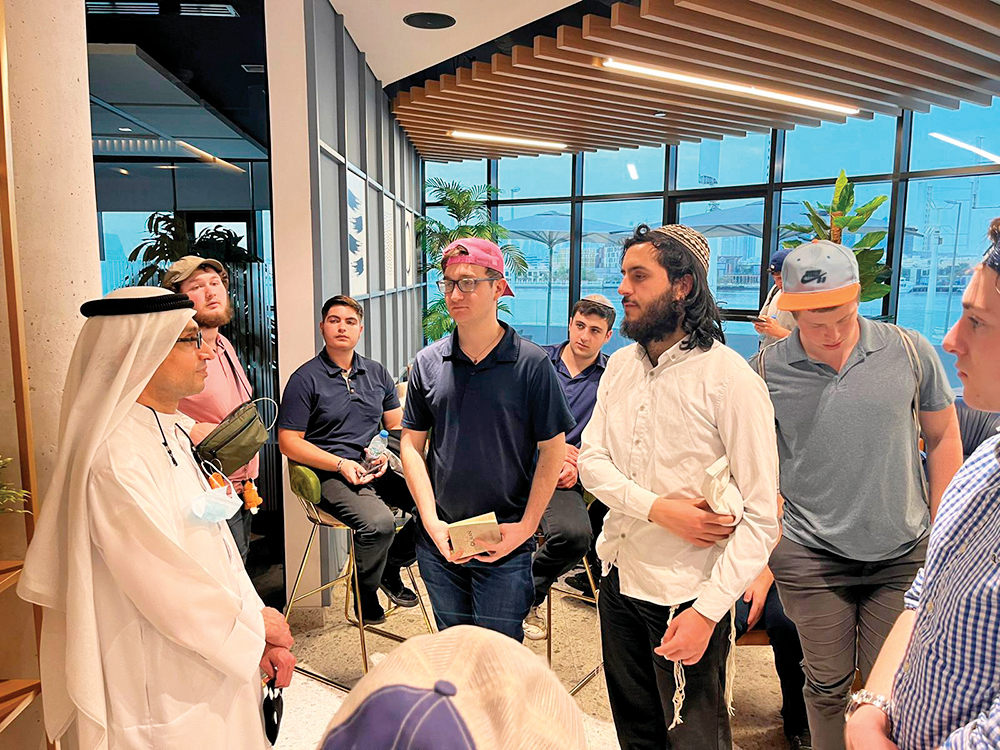
When I visited Bahrain with Migdal last year, the social climate did not always feel as pro-Israel comapred to the political one, so experiencing this pro-Israel social climate was captivating. Senior Rosh Yeshiva Rabbi Dr. Dvir Ginsberg further added that for the UAE, the Abraham Accords are not just about avoiding conflict and a confined relationship: “The UAE sees its decision as a hope for friendship, one based on mutual respect.”
The second day of the journey saw our group visiting the Maimonides synagogue at the Abrahamic Family House—an architectural marvel embodying the ethos of religious tolerance and inclusivity. Here, we witnessed firsthand the UAE’s commitment to fostering interfaith harmony. We also met with the rabbi of the shul, Rabbi Jeff Berger. Rabbi Berger shared that the architect of the Abrahamic Family House originally had no plans to add a shul, only designing the mosque and church. The project started as a result of the UAE declaring a “Year of Tolerance” to reject extremism and foster respectful communication between the peoples and cultures of the world, culminating in a papal visit. However, the government of the UAE made clear that a complex dedicated to the Abrahamic faiths was not complete without a shul. Now, the members of the community have their Shabbat kiddush generously sponsored by the government of the UAE every week.
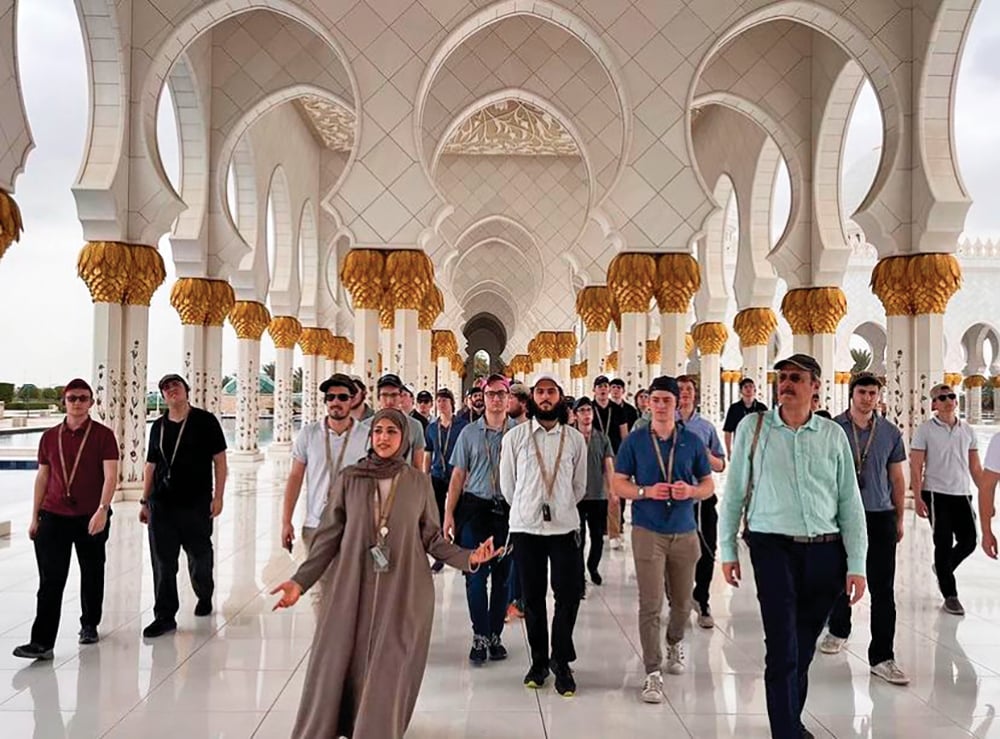
The next stop on our journey was a visit to the Sheikh Zayed Grand Mosque of the UAE, which left us in awe of its grandeur and majesty. Adorned with intricate gold inlays and ornate chandeliers, the mosque “showed the dedication and reverence to God that Islam has,” as Mo Wasserman of Englewood said. Judah Belgrade of Teaneck really appreciated that the Muslims he met with were “open to sharing their traditions,” which really helped him see that Islam and Judaism have more in common than people realize.
Capping off the day, we had the incredible opportunity to meet with Marc J. Sievers, director of AJC Abu Dhabi: The Sidney Lerner Center for Arab-Jewish Understanding, and former United States Ambassador to Oman, as well as representatives of the current Israeli ambassador to the UAE. They again reiterated that the UAE did not recall their ambassador, and highlighted current talks between the UAE and Israel, demonstrating that Israel’s war in Gaza is not the end of diplomacy in the Middle East and there is hope for peace. The speakers also gave us a detailed review of the history of the UAE’s Jewish community, and their vision for its continued growth and appeal in the future.
The next day, we had the opportunity to visit UAE’s Holocaust museum, the only one in the Middle East outside of Israel. While touring the museum, which is part of the Crossroads of Civilizations Museum, as well as the Rare Books, Manuscripts and Prints Museum, and Armory Museum, we had a chance to talk to Sheikh Ahmed Obaid Al Mansoori, a former member of the UAE Federal National Council, and owner and curator of the museum. The museum had existed even before the signing of the Abraham Accords, another example of the UAE’s commitment to peace and coexistence. Our discussions with His Excellency gave us a broader insight into the shared history of Jews and Muslims in the Middle East and provided a platform for candid discussions on coexistence and mutual respect between our communities. Sheikh Al Mansoori emphasized the importance of recognizing that the current conflict is a political one, and does not reflect the shared values of Judaism and Islam, nor the relationship they should have. “Knowing that there are welcoming people like Sheikh Al Mansoori who want us to learn from each other and bridge the divide that has formed between our communities is comforting,” said Gabriel Nelkin of Englewood when asked about his hopes for the future
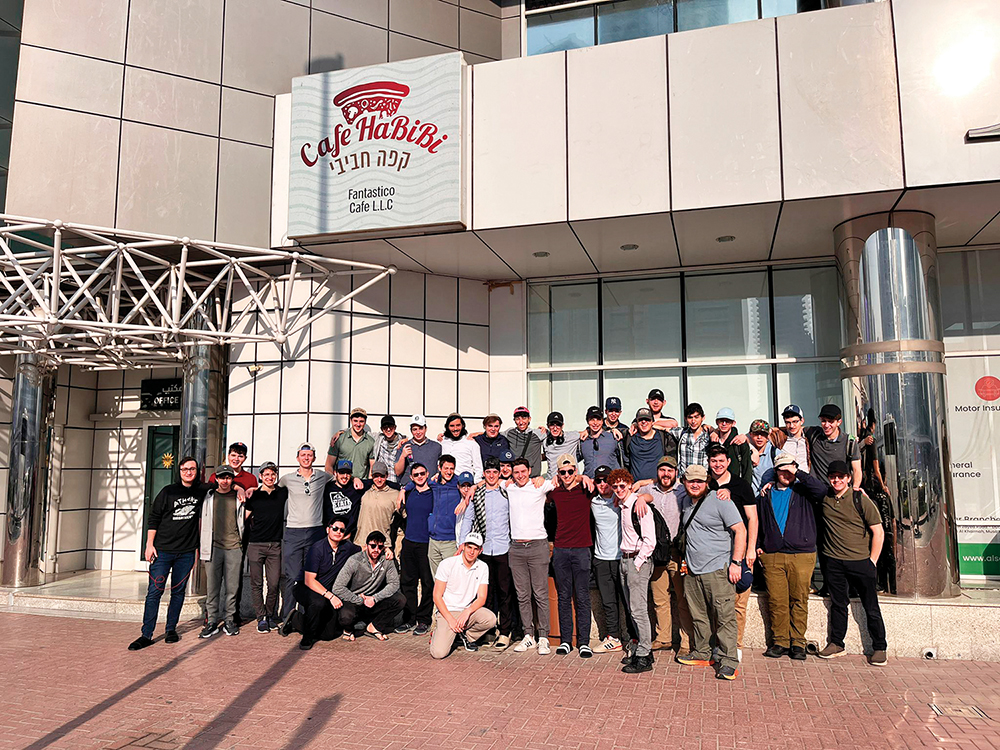
Further bolstering Nelkin’s beliefs, on our last night in the UAE, our group was privileged to hear from renowned peace activist Loay Al Shareef who gave a brief but passionate speech about peace, God and his hopes for the future. Al Shareef hopes to visit Israel soon, believing that the conflict will soon be over, and there will be a new framework for a lasting peace between Israel and Palestinians. He hopes this will ease the current tensions between Muslims and Jews, allowing for greater interfaith dialogue on our shared monotheistic values.
Reflecting on the trip, Rabbi Dr. Ginsberg believes that “after October 7, it became even more important for our students to isolate the evil exhibited by Hamas from the rest of the Islamic world.” Traveling to the UAE was an opportunity for students to see how a vibrant and successful Islamic country, one which shares many Jewish values, functions and prospers. Rabbi Dr. Ginsberg hopes that ”the yeshiva’s trip to the UAE served as a testament to the power of dialogue and cultural exchange in fostering mutual understanding and building bridges across religious divides.” As our journey drew to a close, we departed the UAE with a newfound appreciation for the rich tapestry of Islamic culture and a deepened understanding of the shared values underpinning Judaism and Islam, carrying with us the hope of a future defined by cooperation, respect and enduring peace.
Sam Savetsky of Bergenfield is a shana bet student currently studying at Yeshivat Migdal HaTorah in Modi’in.









